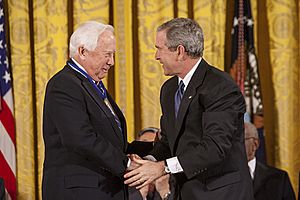David McCullough facts for kids
Quick facts for kids
David McCullough
|
|
|---|---|
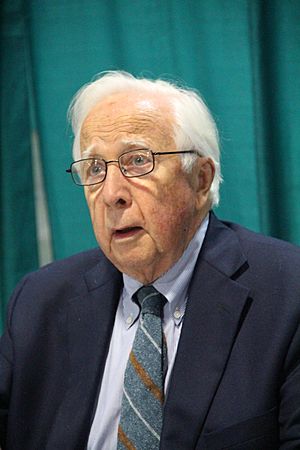
At the 2015 National Book Festival
|
|
| Born | David Gaub McCullough July 7, 1933 Pittsburgh, Pennsylvania, U.S. |
| Died | August 7, 2022 (aged 89) Hingham, Massachusetts, U.S. |
| Occupation |
|
| Alma mater | Yale University (BA) |
| Period | 1968–2022 |
| Subject | American history |
| Notable works |
|
| Notable awards |
|
| Spouse |
Rosalee Barnes
(m. 1954; died 2022) |
| Children | 5 |
David Gaub McCullough (born July 7, 1933 – died August 7, 2022) was a famous American historian and storyteller. He won the Pulitzer Prize twice and also the National Book Award two times. In 2006, he received the Presidential Medal of Freedom. This is one of the highest awards a civilian can get in the United States.
David grew up in Pittsburgh, Pennsylvania. He studied English at Yale University. His first book, The Johnstown Flood, came out in 1968. He wrote many more books about important American figures and events. These included presidents like Harry S. Truman and John Adams. He also wrote about the Brooklyn Bridge and the Panama Canal.
McCullough also narrated many documentaries. He was the voice for The Civil War by Ken Burns. He also narrated the 2003 movie Seabiscuit. For twelve years, he hosted the TV show American Experience. Two of his Pulitzer Prize-winning books, Truman and John Adams, were made into TV shows by HBO.
| Top - 0-9 A B C D E F G H I J K L M N O P Q R S T U V W X Y Z |
David McCullough's Early Life and Education
Growing Up in Pittsburgh
David McCullough was born in Point Breeze, a neighborhood in Pittsburgh, Pennsylvania. His parents were Ruth and Christian Hax McCullough. He had a mix of Scots-Irish, German, and English family roots.
David was one of four sons. He described his childhood as "marvelous." He enjoyed many different things, like sports and drawing cartoons. His parents and grandmother often read to him. This helped him love books from a young age. His family also talked about history a lot. David felt history should be discussed more often.
He really loved school every day. He thought about many different jobs. These included being an architect, actor, painter, writer, or lawyer. For a while, he even thought about becoming a doctor.
Studying at Yale University
In 1951, David started attending Yale University. He felt it was a special chance to study English there. He learned from great teachers like John O'Hara and Robert Penn Warren. He sometimes ate lunch with the famous writer Thornton Wilder. Wilder taught him that a good writer keeps readers guessing. This is true even if the book is about real events.
While at Yale, David joined a group called Skull and Bones. He also worked at magazines like Time and Life. He also worked for American Heritage. He loved doing research for these jobs. He said, "Once I discovered the endless fascination of doing the research and of doing the writing, I knew I had found what I wanted to do in my life." He graduated from Yale in 1955 with a degree in English. He had planned to write fiction or plays.
David McCullough's Writing Career
Starting as a Writer
After college, McCullough moved to New York City. He worked as a trainee at Sports Illustrated. Later, he became an editor and writer in Washington, D.C. He worked for the United States Information Agency. After twelve years of editing and writing, he felt ready to write his own book.
McCullough didn't plan to write history at first. But he found a story he thought was "powerful, exciting, and very worth telling." While working at American Heritage, he wrote in his free time for three years. His first book, The Johnstown Flood, came out in 1968. It was about one of the worst flood disasters in U.S. history. Critics praised the book highly. John Leonard from The New York Times called him "our best social historian." Even though money was tight, his wife Rosalee encouraged him to become a full-time writer.
People often ask me if I'm working on a book. That's not how I feel. I feel like I work in a book. It's like putting myself under a spell. And this spell, if you will, is so real to me that if I have to leave my work for a few days, I have to work myself back into the spell when I come back. It's almost like hypnosis.
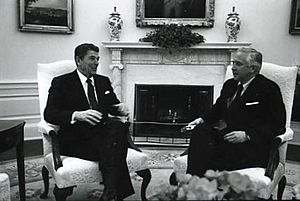
Becoming a Well-Known Historian
After his first book was a success, two publishers offered him new contracts. One wanted him to write about the Great Chicago Fire. The other wanted a book about the 1906 San Francisco earthquake. His first publisher, Simon & Schuster, also offered him another contract. McCullough decided to write about something positive. He remembered his Yale teacher, Thornton Wilder. Wilder said he wrote about things he wanted to learn.
McCullough chose to write about the Brooklyn Bridge. He had walked across it many times. This book was published in 1972. He also decided to write about the Panama Canal. Both ideas were accepted by his publisher.
To me history ought to be a source of pleasure. It isn't just part of our civic responsibility. To me it's an enlargement of the experience of being alive, just the way literature or art or music is.
– David McCullough
Five years later, The Path Between the Seas: The Creation of the Panama Canal was released. This book made McCullough very famous. It won the National Book Award for History. It also won the Samuel Eliot Morison Award and the Francis Parkman Prize. In 1977, McCullough went to the White House. He advised President Jimmy Carter and the United States Senate about the Torrijos–Carter Treaties. These treaties would give Panama control of the Canal. Carter later said that the treaties might not have passed without McCullough's book.
Writing About People in History
McCullough's fourth book was his first biography. He believed that "history is the story of people." In 1981, he released Mornings on Horseback. This book told the story of seventeen years in the life of Theodore Roosevelt. Roosevelt later became the 26th President of the United States. The book covered Roosevelt's childhood up to 1886. It showed a "life intensely lived." This book won McCullough's second National Book Award.
Next, he published Brave Companions in 1991. This was a collection of essays he had written over twenty years. The essays were about different historical figures. These included Louis Agassiz, Alexander von Humboldt, and Harriet Beecher Stowe.
His next book was his second biography, Truman (1992). It was about Harry S. Truman, the 33rd U.S. president. This book won McCullough his first Pulitzer Prize. It won in the "Best Biography or Autobiography" category. Two years later, the book was made into a TV movie called Truman. Gary Sinise played President Truman in the film.
I think it's important to remember that these men are not perfect. If they were marble gods, what they did wouldn't be so admirable. The more we see the founders as humans the more we can understand them.
– David McCullough
McCullough spent seven years working on his next book. In 2001, he published John Adams. This was his third biography about a U.S. president. It became one of the fastest-selling non-fiction books ever. It won McCullough his second Pulitzer Prize in 2002. He first planned to write about both John Adams and Thomas Jefferson. But he decided to focus only on Adams. HBO made John Adams into a seven-part TV miniseries. It came out in 2008 and starred Paul Giamatti as John Adams.
McCullough's book 1776 tells the story of the year the United States was founded. It focuses on George Washington and the Continental Army. It also covers the struggles for independence. Because McCullough was so popular, 1.25 million copies were printed at first. This was much more than a typical history book. When it was released, it became a number one best-seller in the U.S.
McCullough considered writing a sequel to 1776. However, he signed a contract to write about Americans in Paris. This book, The Greater Journey, was published in 2011. It tells about 19th-century Americans who moved to Paris. These included famous people like Mark Twain and Samuel Morse. They became important in culture or innovation.
McCullough's book The Wright Brothers came out in 2015. His last book, The Pioneers, was published in 2019. It tells the story of the first European American settlers in the Northwest Territory. This was a huge wilderness where the Ohio River was the main path.
David McCullough's Personal Life
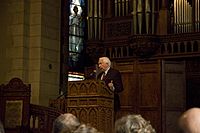
In 1954, David McCullough married Rosalee Barnes. They had met as teenagers. They stayed married until her death on June 9, 2022. They had five children together. In 2016, the couple moved from Boston to Hingham, Massachusetts. Three of their children also lived there. He also had a summer home in Camden, Maine. David enjoyed sports, history, and art. He liked watercolor and portrait painting.
His son, David Jr., is an English teacher. In 2012, he gave a famous graduation speech. He told the students they were "not special." His speech became very popular online. Another son, Bill, is married to the daughter of former Florida governor Bob Graham.
McCullough was an independent voter. He usually didn't talk about current political issues. He often said, "My specialty is dead politicians." But during the 2016 United States presidential election, he did criticize Donald Trump. He called Trump "a monstrous clown with a monstrous ego."
McCullough also taught writing at Wesleyan University. He was a visiting scholar at Cornell University and Dartmouth College.
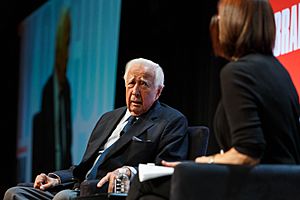
After a period of poor health, David McCullough passed away at his home in Hingham. He died on August 7, 2022, at the age of 89.
Awards and Honors for David McCullough
David McCullough received many awards. In December 2006, he received the Presidential Medal of Freedom. This is the highest award a U.S. civilian can get. In 1995, the National Book Foundation gave him a lifetime award. It was for his great contributions to American writing.
McCullough was given more than 40 honorary degrees. These are special degrees from colleges and universities. One was from Eastern Nazarene College in Quincy, Massachusetts. This is the hometown of John Adams.
He won two Pulitzer Prizes and two National Book Awards. He also won two Francis Parkman Prizes. He received the Los Angeles Times Book Prize and the New York Public Library's Literary Lion Award. In 2003, the National Endowment for the Humanities chose McCullough for the Jefferson Lecture. This is the U.S. government's highest honor in the humanities. His lecture was called "The Course of Human Events."
In 1995, McCullough received the Peggy V. Helmerich Distinguished Author Award. This award is given each year by the Tulsa City-County Library.
People called McCullough a "master of the art of narrative history." The New York Times critic John Leonard said McCullough was "incapable of writing a page of bad prose." His books have been printed in ten languages. Over nine million copies have been sold. All of his books are still available today.
In December 2012, Allegheny County, Pennsylvania, renamed the 16th Street Bridge in Pittsburgh. It was renamed the David McCullough Bridge in his honor.
On November 16, 2015, the Air University of the United States Air Force gave McCullough an honorary degree. He also became an honorary member of Phi Beta Kappa at Yale University in 2015.
On May 11, 2016, McCullough received the United States Capitol Historical Society's Freedom Award. It was given in the National Statuary Hall.
In September 2016, McCullough received the Gerry Lenfest Spirit of the American Revolution Award. This was from the Museum of the American Revolution.
David McCullough's Works
Books Written by David McCullough
| Title | Year | Main Topic | Awards | Interviews |
|---|---|---|---|---|
| The Johnstown Flood: The Incredible Story Behind One of the Most Devastating Disasters America Has Ever Known | 1968 | Johnstown Flood | ||
| The Great Bridge: The Epic Story of the Building of the Brooklyn Bridge | 1972 | Brooklyn Bridge | Talk by McCullough on The Great Bridge, September 17, 2002, C-SPAN | |
| The Path Between the Seas: The Creation of the Panama Canal, 1870–1914 | 1977 | Panama Canal, History of the Panama Canal | National Book Award – 1978 Francis Parkman Prize – 1978 Samuel Eliot Morison Award – 1978 Cornelius Ryan Award – 1978 |
|
| Mornings on Horseback | 1981 | Theodore Roosevelt | National Book Award – 1982 | |
| Brave Companions: Portraits in History | 1991 | Essays about famous people | ||
| Truman | 1992 | Harry S. Truman | Pulitzer Prize for Biography or Autobiography – 1993 The Colonial Dames of America Annual Book Award – 1993 Francis Parkman Prize |
Booknotes interview on Truman, July 19, 1992, C-SPAN Talk by McCullough on Truman at the National Press Club, July 7, 1992, C-SPAN |
| John Adams | 2001 | John Adams | Pulitzer Prize for Biography or Autobiography – 2002 | Talk by McCullough on John Adams at the Library of Congress, April 24, 2001, C-SPAN Talk by McCullough on John Adams at the National Book Festival, September 8, 2001, C-SPAN |
| 1776 | 2005 | American Revolution, American Revolutionary War | American Compass Best Book – 2005 | Talk by McCullough on 1776 to the Mount Vernon Ladies' Association, June 9, 2005, C-SPAN Q&A interview on 1776, August 7, 2005, C-SPAN Talk by McCullough on 1776 at the National Book Festival, September 24, 2005, C-SPAN Talk by McCullough on 1776 at the Texas State Capital, October 29, 2005 |
| In the Dark Streets Shineth: A 1941 Christmas Eve Story | 2010 | Winston Churchill, Franklin D. Roosevelt, Arcadia Conference | ||
| The Greater Journey: Americans in Paris | 2011 | Americans in Paris during the 19th Century including James Fenimore Cooper and Samuel Morse | Part one and Part two of Q&A interview on The Greater Journey, May 22 & 29, 2011, C-SPAN Interview on The Greater Journey at the National Book Festival, September 25, 2011, C-SPAN Talk by McCullough on The Greater Journey at the National Book Festival, September 25, 2011, C-SPAN |
|
| The Wright Brothers | 2015 | The Wright Brothers | National Aviation Hall of Fame Combs Gates Award – 2016 | Q&A interview on The Wright Brothers, May 31, 2015, C-SPAN |
| The American Spirit: Who We Are and What We Stand For | 2017 | Q&A interview on The American Spirit, April 23, 2017, C-SPAN | ||
| The Pioneers: The Heroic Story of the Settlers Who Brought the American Ideal West | 2019 | American pioneers to the Northwest Territory | Q&A interview on The Pioneers, May 19, 2019, C-SPAN |
Films and TV Shows Narrated by David McCullough
David McCullough narrated many TV shows and documentaries. He was the host of PBS's American Experience from 1988 to 1999. He also narrated the 2003 film Seabiscuit.
McCullough narrated several documentaries by Ken Burns. These included the Emmy Award-winning The Civil War. He also narrated Brooklyn Bridge and The Statue of Liberty. He was a guest narrator for a Christmas concert special in 2010.
He also narrated many of his own audiobooks. These included Truman, 1776, The Greater Journey, and The Wright Brothers.
List of Films and Shows Narrated
- Brooklyn Bridge (1981)
- Smithsonian World (5 episodes, 1984–1988)
- The Shakers: Hands to Work, Hearts to God (1985)
- The Statue of Liberty (1985)
- Huey Long (1985)
- A Man, A Plan, A Canal: Panama (NOVA) (1987)
- The Congress (1988)
- American Experience (1988–1999)
- The Civil War (9 episodes, 1990)
- The Donner Party (1992)
- Degenerate Art (1993)
- Napoleon (2000)
- George Wallace: Settin' the Woods on Fire (2000)
- Seabiscuit (2003)
- The Most Wonderful Time of the Year (2010)
See also
 In Spanish: David McCullough para niños
In Spanish: David McCullough para niños


